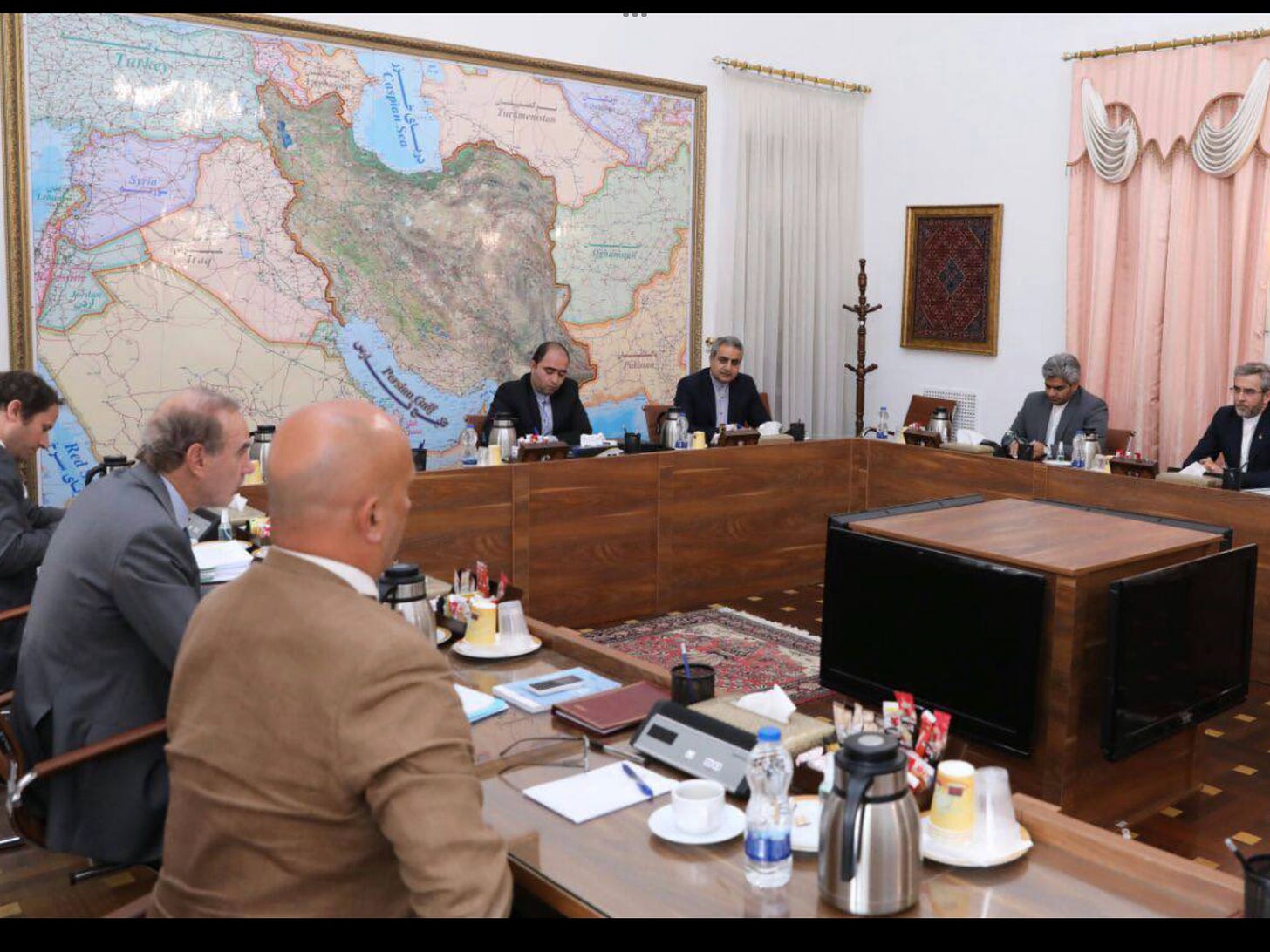Iran talks stalemate 'de-blocked' after EU visit, but 'difficult obstacles' remain
U.S. officials said they were waiting for a detailed debriefing from EU Deputy Secretary General Enrique Mora on his team's discussions in Iran this week, but were not expecting a big breakthrough.

Upshot: U.S. officials said today (May 13) they were still waiting for a more detailed debriefing from European Union Deputy Secretary General Enrique Mora and his team on their discussions in Iran this week, but were signaling in the meantime they were not overly optimistic about a major breakthrough.
“We look forward to a more detailed conversation with the deputy secretary general after his visit,” State Department spokesman Ned Price told journalists on a department press call this morning on Secretary of State Antony Blinken’s upcoming trip to a NATO foreign ministers meeting in Berlin, Germany and then to France.
“All of that said, at this point, … a deal remains far from certain,” Price said.
“It is up to Iran to decide whether it wants to conclude a deal quickly,” Price said. “We and our partners are ready. We have been for some time, but now it’s really up to Iran.”
A senior European Union diplomat reportedly said today there were still obstacles to an agreement on restoring the 2015 Iran nuclear pact, but he thought there are ways they could be overcome.
“We still have difficult obstacles on the way for an agreement, but a good, frank and long conversation with the Iranian side has shown that they are engaged,” the senior EU official told journalists. “And of course the Americans, they are engaged too. So there is still a way to overcome these problems. And this is what we will be working on."
European Union foreign policy chief Josep Borrell said his deputy’s discussions in Iran had helped unblock a stalemate in the talks that has dragged on since March.
“It has gone better than expected,” Borrell told journalists on the sidelines of the G7 foreign ministers’ meeting in Weissenhaus, Germany today. “The negotiations were stalled, and now they have been reopened.”
“The negotiations had been stalled for two months due to this disagreement about what to do the Revolutionary Guards,” Borrell continued. “Mr. Mora visited Iran with a concrete message from my side, saying that we could not continue like this. The answer has been positive enough in order to believe that we can relaunch the work between the parties.”
“These kind of things cannot be solved overnight,” Borrell continued. “Let’s say things were blocked and they have been de-blocked.”
An official involved with Mora’s visit to Iran described the mission yesterday as hard.
“Difficult,” the official, speaking not for attribution to describe how the EU delegation’s meetings in Iran were going, said May 12.
Iran’s National Security Advisor Ali Shamkhani said it was up to the “guilty party”—the United States, which quit the Iran nuclear deal in 2018—to untie the “main knot” in the talks, but said if it resolved to do that, Iran was ready, and an agreement could be reached.
“The Vienna talks have reached a stage that the main knot in the talks can only be opened by the guilty party and its return to the logical and principled path set by Iran,” Shamkhani wrote on Twitter, according to a translation by the BBC. “America, through its bad faith and Europe through its inaction, destroyed the opportunity of benefiting from Iran’s proven good faith.”
“If they have any resolve to return [to the deal], whatsoever, we are ready, and an agreement can be reached,” Shamkhani’s tweet concluded.
Iranian Foreign Minister Hossein Amir-Abdollahian said a deal was within reach if Washington makes its decisions.
“Following my contacts with Josep Borrell, Mr. Mora’s visit and his talks with [Iranian nuclear negotiator Ali] Bagheri were another opportunity to focus on initiatives to resolve the remaining issues,” Amir-Abdollahian wrote on Twitter. “A good and reliable outcome is within reach if US makes its decision & adheres to its commitments.”
The Iranian officials’ comments suggesting a deal was within reach come as there are reports of growing protests in several Iranian cities over rising food prices.
Russia’s envoy to the UN in Vienna Mikhail Ulyanov, meantime, noted that at an earlier point in the talks, Russia might have used its good offices to try to find solutions to bridge remaining differences. But after the breach that has opened up between the western parties and Russia over Russia’s war on Ukraine, Moscow was not going to step up to do that now.
“Under different circumstances Russia, probably, could have provided its good offices to the two sides to finalise agreement on #JCPOA,” Ulyanov wrote on Twitter. “But not now.”
The EU visit to Iran to try to revive the Iran deal came as the UN atomic watchdog agency said Wednesday that Iran had amassed a stockpile of 42 kilograms of uranium enriched up to 60% purity.
“This is an unprecedented level of enrichment for a non-nuclear weapons state party….and it is cause for serious concern,” International Atomic Energy Agency (IAEA) Director General Rafael Grossi said in a report to the European Parliament on Wednesday (May 11).
**


